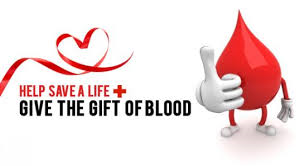St. Joseph’s Hospital and Rotary Seeking Donors for Blood Drive
April 9, 2020

ST. JOSEPH’S HOSPITAL AND THE ROTARY CLUB OF BUCKHANNON-UPSHUR SEEKING DONORS FOR BLOOD DRIVE
BUCKHANNON, WV: St. Joseph’s Hospital and the Rotary Club of Buckhannon-Upshur are seeking donors for an upcoming blood drive. Hospitals in West Virginia need 600 donations per day and every donation can save as many as three lives.
The blood drive will be held on Tuesday, June 16, and Thursday, June 25, 2020. Donors need to be identified prior to the drive and appointments will be scheduled. Blood will be drawn by Vitalant which is the blood supplier for St. Joseph’s Hospital and United Hospital Center.
If you are willing to be a blood donor, call 304-473-2164 or email Allyson.Fell.m@wvumedicine.org with your name, phone number and email address.
Concerned about donating blood during COVID-19? Yes, it is safe.
Proper precautions will be taken to protect donors and healthcare workers during the COVID-19 pandemic.
St. Joseph’s Hospital’s blood supplier, Vitalant, has a COVID-19 FAQ page here:
https://www.vitalant.org/COVID-FAQs
The U. S. Food & Drug Administration (FDA) has provided a statement on the need for and safety of donating blood during the pandemic, and you may read that here:
https://www.fda.gov/news-events/press-announcements/coronavirus-covid-19-update-blood-donations
And, here:
FDA STATEMENT
Coronavirus (COVID-19) Update: Blood Donations
For Immediate Release:March 19, 2020Statement From:Director – Center for Biologics Evaluation and Research (CBER)Peter Marks M.D., PhD.
The nation’s blood supply requires a steady supply of donors who generously donate millions of units of potentially life-saving blood and blood components each year. Every two seconds, a patient needs a blood transfusion.
At this time the number of blood donations has been dramatically reduced due to the implementation of social distancing and the cancellation of blood drives. We fully support President Trump’s Coronavirus Guidelines for America, which includes recommendations to avoid social gatherings of more than 10 people and the need to practice good hygiene, like hand washing.
We also recognize that maintaining adequate levels of our nation’s blood supply is critical. People who donate blood are equivalent to those people who are working in a critical infrastructure industry. In volunteering to do so, they are contributing immeasurably to the public health of our nation. In order to ensure that blood is available to those who need it most, it is important for healthy individuals who are able to donate to take the time to do so.
Blood donation centers can facilitate the safe donation of blood because they are skilled in infection control practices and already have procedures in place to prevent the spread of infections. Blood donation centers always take steps to prevent staff and donors who are not feeling well or who have a fever from reaching the donor area, and they are now taking additional social distancing precautions wherever possible, consistent with the President’s Coronavirus Guidelines for America.
Donating blood is safe and takes only a little of your time. At many blood donation centers, those who are interested in donating can make an appointment to minimize the time it takes to donate blood. Centers can arrange to call a donor’s mobile phone when they’re ready for the donor to come in.
Those interested in donating blood may contact the following organizations to find a local blood collection site and to schedule an appointment:
AABB: www.aabb.orgExternal Link Disclaimer
America’s Blood Centers: www.americasblood.orgExternal Link Disclaimer
American Red Cross: www.redcrossblood.org External Link Disclaimer
Armed Services Blood Program: www.militaryblood.dod.mil External Link Disclaimer
Blood Centers of America: www.bca.coopExternal Link Disclaimer
The FDA, an agency within the U.S. Department of Health and Human Services, protects the public health by assuring the safety, effectiveness, and security of human and veterinary drugs, vaccines and other biological products for human use, and medical devices. The agency also is responsible for the safety and security of our nation’s food supply, cosmetics, dietary supplements, products that give off electronic radiation, and for regulating tobacco products.
###
Inquiries
Media: Stephanie Caccomo 301-348-1956Consumer: 888-INFO-FDA